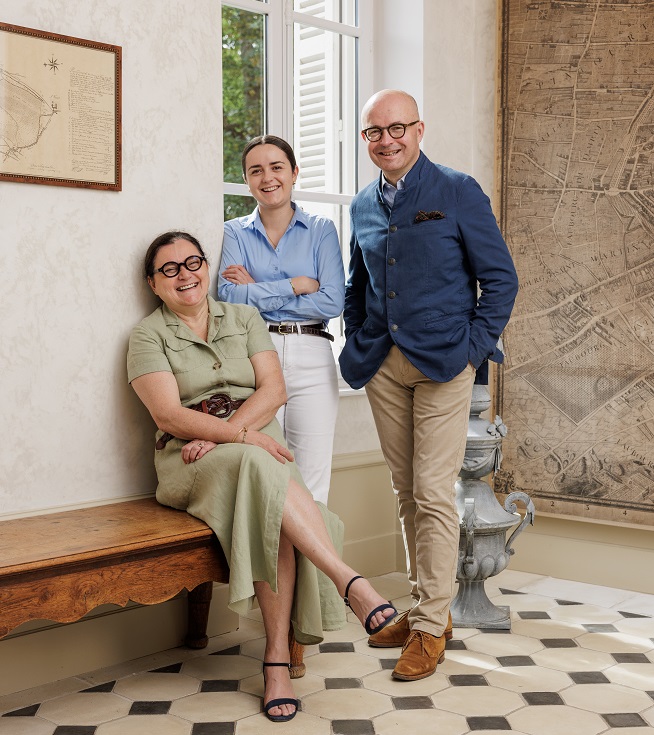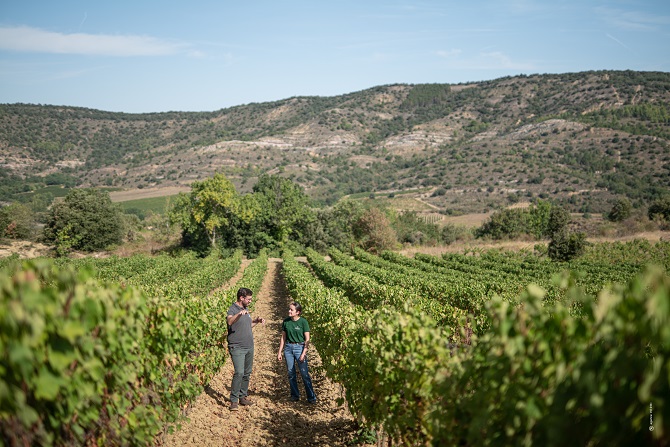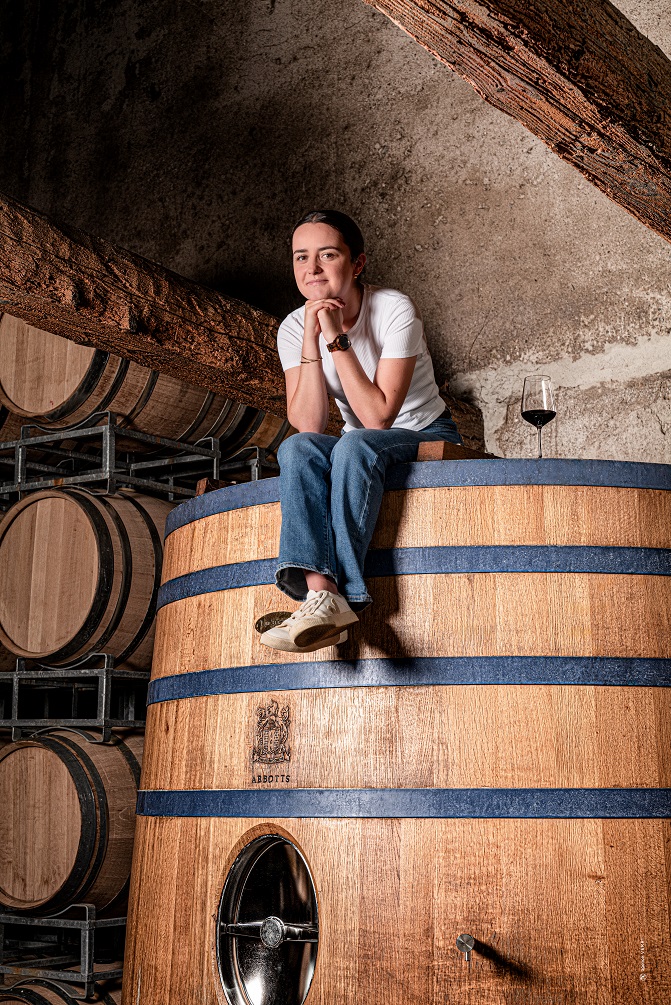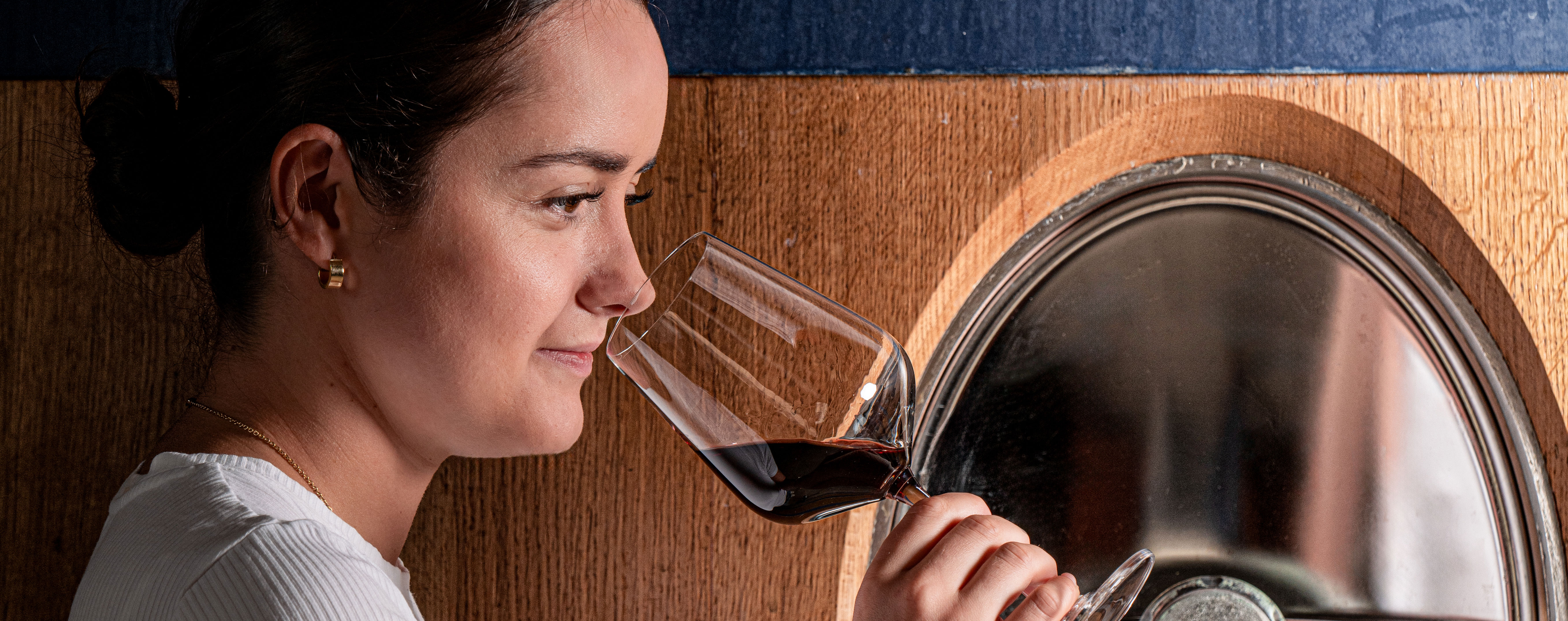Newly-named Delaunay Vins & Domaines, the former Badet-Clément group is unusual among French wine producers in that it straddles two regions – Burgundy, where it regained Édouard Delaunay from Boisset in 2017, and Languedoc, where it bought Abbotts & Delaunay from Nerida Abbott in 2005. The group also owns Les Jamelles in Aude, the brand launched in the mid-1990s. In just under four decades, the group has built a turnover of €64m, selling 15m bottles and exporting to more than 55 countries.
Jeanne, representing the sixth generation of Delaunay winemakers from Burgundy, has been put in charge of Abbotts & Delaunay. She says she aims to be heavily involved in the vinification of the wines at its three properties – organic estate Domaine de la Métairie d’Alon in Limoux, Domaine de la Lause in Corbières, and Domaine du Trésor in Narbonne – as well as being responsible for the brand’s new strategy and marketing. Her arrival there this summer also signified a new era for the brand, which was designed by her father, Laurent Delaunay, to be the benchmark for premium wines from the Languedoc.

Meanwhile, this move gives her winemaking parents the chance to focus on the other brands in the group. Laurent will concentrate on Édouard Delaunay in Burgundy and Catherine will continue with Les Jamelles branded varietal wines.
At the launch of the new company name, Laurent commented: “It feels like the circle is now finally complete and as our Badet Clément chapter closes, our Delaunay Vins & Domaines story beings! We have once again become a proud family wine business and I am delighted that it will pass from generation to generation as is the tradition in Burgundy and the wider French winemaking community.”
Canopy caught up with Jeanne on a video call. Here is an edited version of our conversation…
Canopy: Tell us about the changes in the family business.
Jeanne Delaunay: “I joined the company in June this year. So now each of the members of the family have a specific role in the company. My father is dealing with Édouard Delaunay, the Burgundy family winery, my mother is in charge of Les Jamelles, which is the great varietal Languedoc brand. And I am in charge of Abbotts & Delaunay, the boutique winery of the Languedoc, specialising in terroir and appellation wines. So, we have one member of the family in charge of our three main brands and wine houses, so the family aspect of the wine business is really becoming more and more important.”
Did you land Abbotts & Delaunay because that was the one that was left – because your mother has a passion for Les Jamelles and your father has a passion for Édouard Delaunay?
Jeanne: “It’s kind of that but we don’t say it’s the one that was left so I took it. My mother has always been in charge of Les Jamelles. She’s the winemaker, she’s talented, she’s been in charge of Les Jamelles since the beginning, since 1995. Then my father was taking care of both Abbotts & Delaunay and Édouard Delaunay, but since we bought back Édouard Delaunay (in 2017), he was a little bit more focusing on Édouard Delaunay as it was new and needed to be relaunched. But I was coming (to join the family business) and I was needed at Abbotts & Delaunay, and it’s a really good opportunity for me because I’m in charge of one of the big wineries of the family, which is really interesting. I’m also in charge of a Languedoc winery.
“I have studied in Burgundy, I’ve worked in Burgundy, but I didn’t have a lot of knowledge about Languedoc except from what my parents were teaching me. So, it’s really exciting, it’s really new for me. It’s a high-end winery that vinifies great wines in Languedoc, so I’m not taking the one left, I’m taking something I like.”
What’s your main objective?
Jeanne: “My main objectives for the brand are to continue to evolve the style of these haut-couture wines made on exceptional Languedoc terroirs but in a Burgundy way. First by focusing on our own 35ha of vines at Domaine de la Metairie d’Alon in Limoux and Domaine de la Lause at Monze, then supplementing this by buying in fruit and wines, developing partnerships with interesting growers and by putting a real focus on terroirs with a strong identity and single vineyards.”
Do you feel some sort of extra pressure because you’re the next generation and your parents are both talented winemakers?
Jeanne: “Actually, it’s not really pressure, it’s more I’m really excited. My great-great-grandfather created Édouard Delaunay in 1893, so 130 years ago, and it’s still here. Joining the family wine business, it’s not really pressure, because it’s what I like, it’s what I know. So, it’s more I’m excited. And I’m happy to be the next generation.”
Were you always going to come into the wine business, or did you ever consider anything else?
Jeanne: “I was born in a wine family. I grew up in Burgundy, with a lot of friends having parents in wine. So, I was always in the middle of the wine environment. I was never forced to work in wine and I wasn’t sure I wanted to work in wine because I was passionate about so many things when I was young. I wanted to be an engineer that builds aeroplanes, I wanted to be an Olympic athlete, I wanted to travel and discover the world. So, I wanted to do so many things and my parents never forced me to work in wine. But when I finished high school, and I had to choose something to study, I was thinking of wine, but I was not sure.
“I was at a business school where, every year, you have an internship to do. And I decided to experience the wine industry. My first internship was in a winery and I really liked it. So, the second year, I did an internship in a wine shop and it was also really great. The third year I did an internship in the marketing team of Francis Ford Coppola winery in California. And it was really great. So, I continue like that. I finished my business school with an internship at the Burgundy wine board, BIVB. It was my first experience in Burgundy. But, after all of that, I was sure I wanted to work in wine… But I wanted to have more technical and winemaking knowledge, so I did studies in viticulture and winemaking in Beaune in Burgundy and then I had experiences in Burgundy domaines. I did a year at Thibault Liger-Belair and the vinification in Romanée-Conti in 2022, and also in Coldstream Hills Winery, Australia.”
Are you feeding any of your experiences from around the world into Delaunay Vins & Domaines?
Jeanne: “We discussed before I went back to Australia that I will be joining the family business and I will take over Abbotts & Delaunay. It’s funny because Abbotts & Delaunay was created by two Australian winemakers in 1996, and I was going to Australia to experience Australian winemaking.”
But what have you picked up from your travels that you’ve been able to feed into the business?
Jeanne: “I’ve taken the experience of winemaking from both Burgundy and Australia. That’s great because Languedoc is kind of between both. It’s French, it’s kind of traditional winemaking but with a little bit of modern winemaking, like in Australia. So, I’m not lost in the winery. I’m where I should be.”

The experience of Burgundy and Australia seems most relevant at Domaine de la Métairie d’Alon, the 25ha estate specialising in Chardonnay and Pinot Noir. (Laurent acquired the estate – a stone’s throw from Limoux – in 2015.)
Jeanne: “It’s really the best place to grow Pinot Noir and Chardonnay in the Languedoc. The soils are limestone and clay like in Burgundy. It’s not far from the Pyrenees Mountains, so the vineyards are at 400 metres in altitude, where the climate is colder and fresher than in the rest of the Languedoc. So, good soil and good climate. We use our Burgundy know-how to vinify the Burgundian way: in small tuns. The guy in charge of the vineyard (Thomas Trapet, above) is coming from Burgundy and has worked in very beautiful domaines there, so we really do it the Burgundian way – but in the south of France.”
How do the wines compare to those from Burgundy?
Jeanne: “They are from the south of France, so they are a little more concentrated. But they have the freshness and the acidity with the altitude, so they are perfectly balanced between complexity, concentration, and freshness. Sometimes people think they are coming from Burgundy. Last time I had a dinner with some clients of my father and they had Romanée-Conti wine and, just after, I served some Pinot Noir from Domaine de la Métarie and I was not afraid of coming after Romanée-Conti.”
You believe the region has a lot of potential – is that just for Pinot Noir and Chardonnay?
Jeanne: “It’s definitely a region that has a lot of potential. It’s coming from the Mediterranean Sea, going from the mountains of the Pyrenees to the Atlantic Ocean. It’s a huge region with so many different terroirs and climates. So, it’s really interesting for a young winemaker like me to discover, but it’s going to take me years and years to discover perfectly everything. I know it’s a good place to grow Pinot Noir and Chardonnay, but there are also some perfect terroirs for Syrah. For example, we have another domaine, Domaine de la Lause in the north of the Corbières, in a place that is a little bit in altitude, and we grow really beautiful Syrah there. Sometimes it’s a bit strong, with a lot of body and so on. Good spices, but in attitude, so it can give very, very interesting wines. I discovered the cool-climate Syrah when I was in the Yarra Valley, in Australia, and I fell in love with it. This is what we’re doing in Domaine de la Lause. We are also doing a very good Grenache Gris.”
(Until now Domaine de La Lause, which the family bought in 2019, sold grapes to Les Jamelles, but it will release its own wines from the 2023 vintage next year.)
With Abbotts & Delaunay, what are you doing with the brand now it’s under your wing?
Jeanne: “Abbotts & Delaunay is our appellation brand. I want to go a little further in this approach. A kind of Burgundy approach in the Languedoc – producing very good domaine wines, but also buying some grapes from the best places to vinify and do other amazing wines. But for now, we are working a lot on the marketing, rebranding, packaging. It’s a little bit early to show you anything. But yeah, this is really the vision we want to have.”
When are we likely to see all these changes?
Jeanne: “You will probably start to see all the changes next year.”
‘I know where I want to go’Each of the domaines has an established winemaking team – how hands-on will you be?
Jeanne: “In the vineyards we have three people all the time and in the cellar we have one cellarmaster all the time. For the vinification period we have one or more people. Also, I’m here all the time for the harvest and vinification. I’m in the cellar and vineyards all the time. For the rest of the year, maybe half of my time in the vineyard and the cellar. I’m really involved. But also I know that I’m young, and I’m just arriving and new in the winery. And I know that some people are here for, I don’t know, 30 years or something like that. So, I don’t want to take their place. I’m asking them their opinion, their advice all the time, because they have something to teach to me. They know the vineyards and the cellar better than me. But, in the end, I take the decision of what I want to do with the wine. And I know where I want to go.”

Is it still difficult for a young woman in the French wine industry? Or have things really improved?
Jeanne: “In my team, everyone is really happy I’m coming. They know me for a long time; they have seen me when I was young running in the winery, during the vintage and helping at the sorting table. They are so happy I’m coming because it’s showing them the company is going to continue – it’s really the family aspect and it’s truly great for them to see that. So, in my team, I feel really well and it’s not that hard for me to have my place.”
Is your winemaking philosophy the same as your parents’ or, as part of the sixth generation, are you feeling you need to move things on?
Jeanne: “I tasted my first wines with my parents. They were the first to teach me how to taste wine: what is good and what is not good, what are the differences and so on. So, I’m kind of influenced by them. I like mostly what they like, and I dislike what they dislike, so I would not say my philosophy is totally different. It’s mainly the same; we like balance, we like elegance, we like fine wines. But also, we are from Burgundy and in Burgundy what is more important is the terroir – what is in the wine because of the terroir should not be destroyed by the winemaking; the winemaking should be serving the terroir and highlighting it. This is really our winemaking philosophy.”
What sort of age were you when you were tasting wines with your parents?
Jeanne: “I can’t remember. But when I was young, every Sunday, I was allowed to taste a little wine.”
How much of a free rein will you have?
Jeanne: “I’m the one taking the last decision. So, I’m really free in what I want to do. For example, this year, I wanted to experience at Domaine de la Lause the Romanee-Conti way – so 100% whole bunch. I wanted to see what it will give our wines.”
Good luck. I look forward to tasting your wines over the coming years.











.png)









